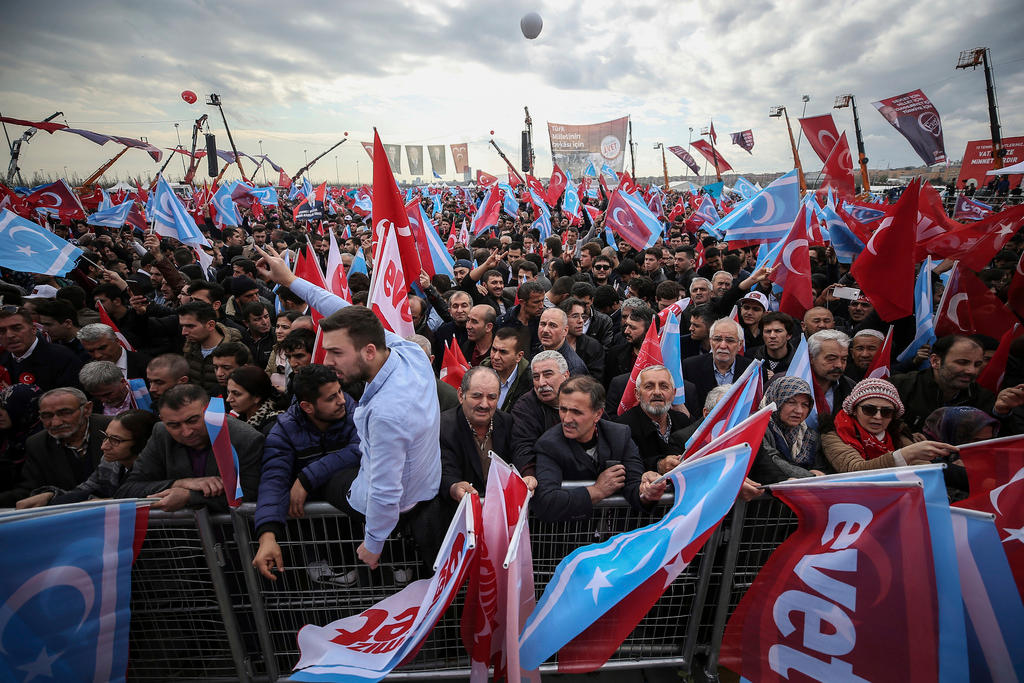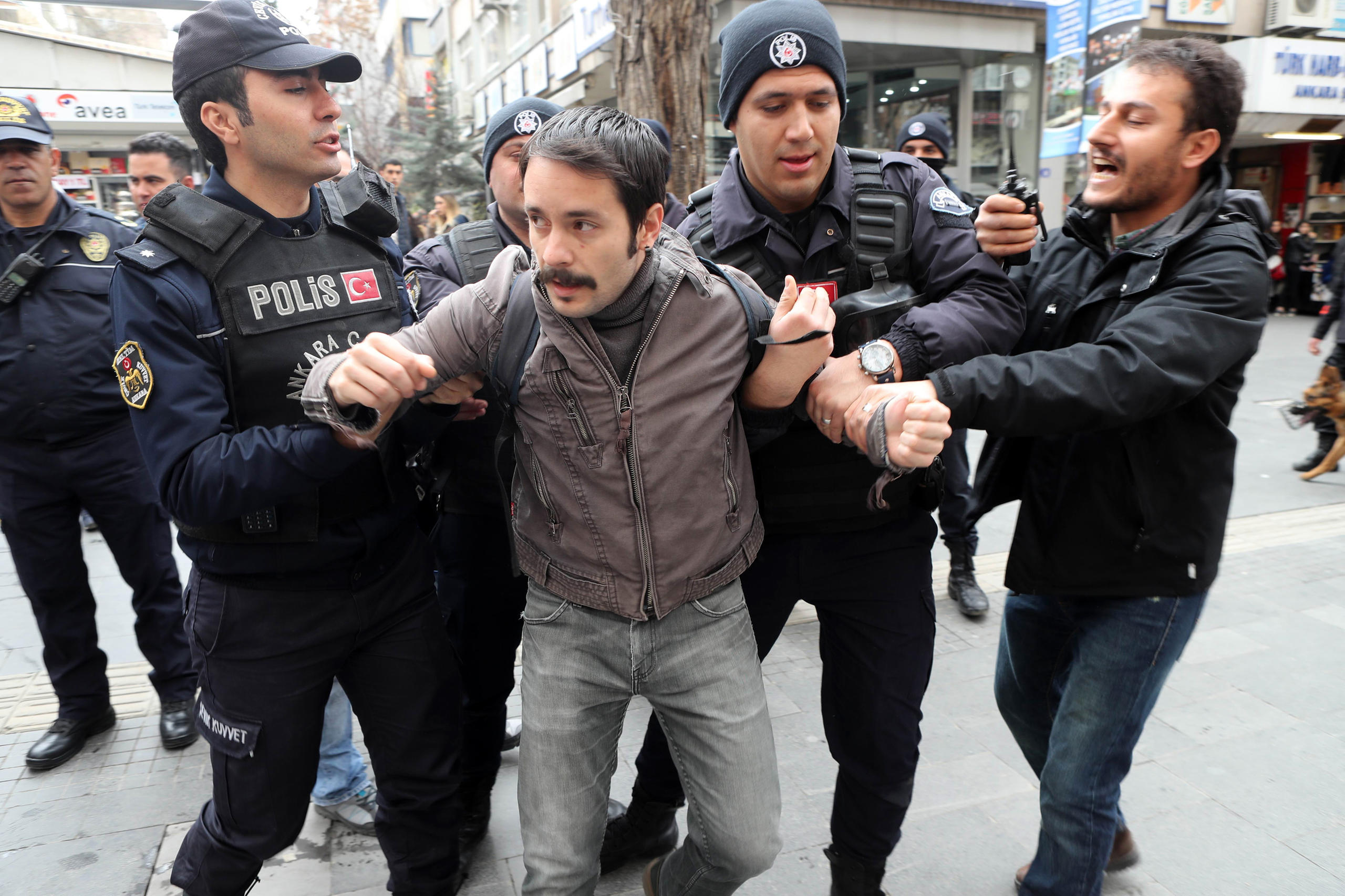How Turkey’s democratic dream turned ugly

Tensions are high between Switzerland and Turkey – all thanks to direct democracy. Or, more precisely, thanks to the handling of direct democracy.
Indeed, a functioning democracy needs freedom of expression like a fish needs water. Here is a five-part analysis ahead of Erdoğan’s constitutional referendum.
1. The vote: On 16 April 2017, 55 million Turks will be asked to vote on the future powers of their president. The constitutional reform proposed by the incumbent conservative Recep Tayyip Erdoğan (prime minister since 2003 and president since 2014) would give the politician near total power and allow him to rule until 2029.
This text is part of #DearDemocracy, a platform on direct democracy issues, by swissinfo.ch.
According to the latest opinion polls, the vote will go right down to the wire. Since the adoption of the present Turkish constitution 35 years ago (through a referendum manipulated by the then military junta), Turkey has voted to reform its constitution five times.
2. Rising tensions: In Switzerland, around 100,000 emigrant Turks (many of which also have a Swiss passport) are eligible to vote in the referendum. As a result, the Turkish authorities have made attempts to indirectly limit the Turkish diaspora’s freedom of expression in Switzerland; the voting platforms where activists campaigned for a ‘Hayir’ (no to the reform) were spied on, for instance.
At the end of March, Swiss Foreign Minister Didier Burkhalter made a clear statement to his Turkish counterpart Mevlüt Cavuşoğlu during his visit to Bern:
“Freedom of expression is a universal value recognised by Switzerland, which hopes that this freedom will also hold true for Turkish citizens whether they cast their votes in Switzerland or in their own country.”

Cavuşoğlu had little quarrel with this, but was given cause for objection a few days later by demonstrators in Bern, whose placards featured the slogan ‘Kill Erdoğan with his own weapons’.
3. Location – Istanbul, 1985: I visited Turkey’s largest city for the first time 32 years ago. The metropolis, which sits on the Bosporus Strait between Europe and Asia, made a shabby, chaotic impression.
Five years after the third military coup since the republic was founded in 1923, the armed forces had a cast-iron grip on the city and country. In a series of show trials, critics of the undemocratic order – professors, journalists and judges – received “the punishment they deserved”, as stated by Chief of General Staff Kenan Evren.
Yet despite this oppression, in many parts of this populous city – a place where domestic water supplies only worked for a few hours each day – I also sensed hope. “I am convinced that we will soon be able to live in harmony together in a liberal, democratic, multi-ethnic European nation”, a young politics student said to me at the İstanbul Üniversitesi, founded in 1454.
4. Location – Istanbul, 2016: As we made the approach to Istanbul-Atatürk International Airport, I gazed out of the window and saw an ultra-modern megacity with almost 15 million inhabitants. High-speed trains connect Istanbul to the rest of the country and we can now travel from Europe to Asia not by rusty ferry, but underground.
In the last three decades, Turkey has been transformed from a poor developing country into a prosperous democracy. It even harbours the great ambition of soon becoming a strategically important member state of the European Union.

However, in the elections in spring 2015, Recep Tayyip Erdoğan’s AKP party lost its absolute majority in parliament. Instead, the Kurdish HDP party entered parliament for the first time after Erdoğan shattered his reputation as a reformer during widespread protests for the environment and democracy in previous years.
In light of this defeat, Erdoğan – who had since become Turkey’s president – had now had enough of democratic progress. He added fuel to the fire of conflict with the sizeable Kurdish minority (12 million people), staged a rerun of the parliamentary election, and lastly used a failed coup on 15 July 2016 to conduct a massive purge that far exceeded those of the generals in the early 1980s. You can find a current tally of those imprisoned or fired in the aftermath of the coup hereExternal link.
Shortly before my flight home, I drank a coffee in the ‘July 15 Heroes of Democracy’ lounge. This political name change took place just a few days after the failed coup, which Erdoğan dubbed “a gift from Allah”.
5. From dream to nightmare: The last 30 years have been the most successful yet, both socially and economically – not just in Turkey, but in large parts of the world. Wealth and democracy have flourished like never before in global history.
However, two things have gone virtually unnoticed. First, this new wealth has only been truly enjoyed by certain social groups. In many places, a few big winners contrast with a very large number of marginalised people.
Second, democracy in many countries has emerged from the rubble of very undemocratic regimes that committed terrible crimes. However, there has been little to no reflection on this history. In Turkey, this history not only includes the brutality of the military regimes, but also the systematic oppression of indigenous minorities and the – hitherto denied – mass murder (genocide) of Armenians in 1915/16 – thus stretching back to the days of the Ottoman Empire.
As a result, the dream of greater openness, freedom and democracy now threatens to become a nightmare – starting with Erdogan’s Turkish referendum on Sunday. With the presidential constitution, Erdogan the ruler presents himself as a “bulwark against chaos” and promises to speak for all in the future “in the name of the people”.
When is a democracy no longer a democracy? Where do you draw the line? Write to us!
Translated from German

In compliance with the JTI standards
More: SWI swissinfo.ch certified by the Journalism Trust Initiative













You can find an overview of ongoing debates with our journalists here . Please join us!
If you want to start a conversation about a topic raised in this article or want to report factual errors, email us at english@swissinfo.ch.